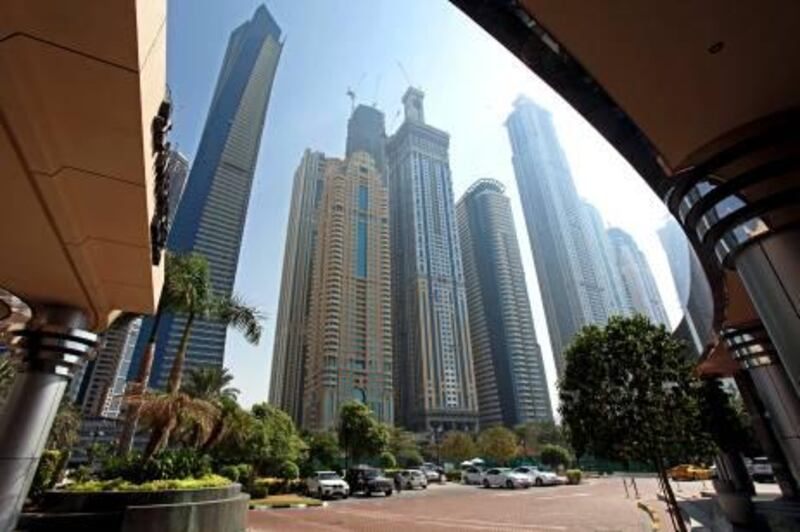Observers of the great property rush and its collapse in the Emirates like to point to the glut of new housing units on the market as a bad sign for the tens of billions of dirhams invested in the sector over the past seven years.
But brokers, analysts and developers increasingly identify a seemingly simple obstacle to a recovery of the sector: the visa law.
In the property sector's heyday, residency visas were guaranteed by developers. It was a quiet luxury, in retrospect, overshadowed at the time by the promise of double-digit price increases every few months and additional perks such as lotteries with private jets and luxury cars that companies used to stoke speculation.
Then last year, when the Federal Government began playing a greater role in the economy and national security, a new law ended the guaranteed visa. It set out stringent criteria for residency visas for expatriate property owners, including proof that an applicant owned a home valued at not less than Dh1 million (US272,000) and had a monthly income of at least Dh10,000. That change was also drowned out by the panic over the collapse of the property sector.
Residency visas now last only six months before needing to be renewed at a cost of Dh2,000. They can be obtained only by exiting and re-entering the country. The property must be completed, fully owned by the visa applicant (except in the case of a joint ownership between husband and wife) and large enough to accommodate the family. They are required to have UAE medical insurance.
Now that the dust from the crash has settled, the visa law's onerous restrictions are a focal point in a debate on how to revive sales and slow the decline of prices. Most important, analysts say, the law should allow for longer-term visas to draw in the thousands of wealthy businessmen from the subcontinent and Middle East.
Of 500 people, including buyers, lawyers and brokers, polled by the law firm Hadef & Partners in a range of property fields between September and October, 88 per cent said "more flexible residence visa options for owners-investors" would aid in the recovery of the sector.
"For people interested in a long-term investment, a short-term visa is a mismatch," says Michael Lunjevich, a lawyer at the firm.
The visa law is not, by a long shot, the only obstacle in a recovery, the survey showed. The issues for investors include a lack of transparency from regulators about cancelled projects, limited financing options, a need for cheaper ways to resolve disputes with developers and a perceived government bias towards developers.
Indeed, 92 per cent of respondents thought "more should be done to protect investors".
But among these obstacles, the visa law is possibly the easiest to correct. By easing the process for regional buyers to obtain second homes in what many see as the most desirable Middle East country in which to live or vacation, the Government can improve the demand side of the equation. Increasing demand is better than reducing supply because restricting the availability of new homes can be perceived as manipulating the market.
Reducing supply also creates more problems than it solves because nearly all of the homes were sold off-plan to investors who already paid a percentage of the price. To cancel or delay construction without refunds - full or in part - would only further hurt the market's reputation.
Extending visas to two years and streamlining the application process would also encourage would-be buyers to take advantage of low prices - especially in favoured neighbourhoods such as Dubai Marina - where prices rose so high during the boom that it would make sense for a speculator to buy only an apartment. Offices are also being marketed at a significant bargain.
Billy Rautenbach, the managing director of the estate agency The Property Store, says better visa conditions and the possibility of business ownership are the two most important changes needed for the sustainability of the property market.
"If you can't come here to work and live, then what is the draw?" she says.
Visa laws can be a hassle for expatriate homebuyers anywhere in the world. In fact, the UAE's visa law is less stringent than that of the US, where buying a home has no impact on whether someone is granted a visa. In the US, there is a visa available for someone who makes substantial investments in a company in the country, but even this visa is not guaranteed.
But the US is not as reliant as Dubai and the Emirates are on foreign investors buying homes. Emirati homebuyers will not be able to take up anything close to the supply available on the market here, and the entire property sector has been structured to handle tens of thousands, if not hundreds of thousands, of expatriates owning homes here.
The choice by the Federal Government to make visas more difficult to obtain is not without its merits. In a region beset by security concerns, who is allowed to live and work in a country is an important concern. It is also not in the Government's interest to grant a visa to someone who lacks the means to survive here. Otherwise, hospitals could become overburdened with people unable to pay their bills. Residents could end up in jail for debt, putting more strain on expenditures at the local and federal level.
The balance will be to reduce security risks while easing the process for property buyers.






